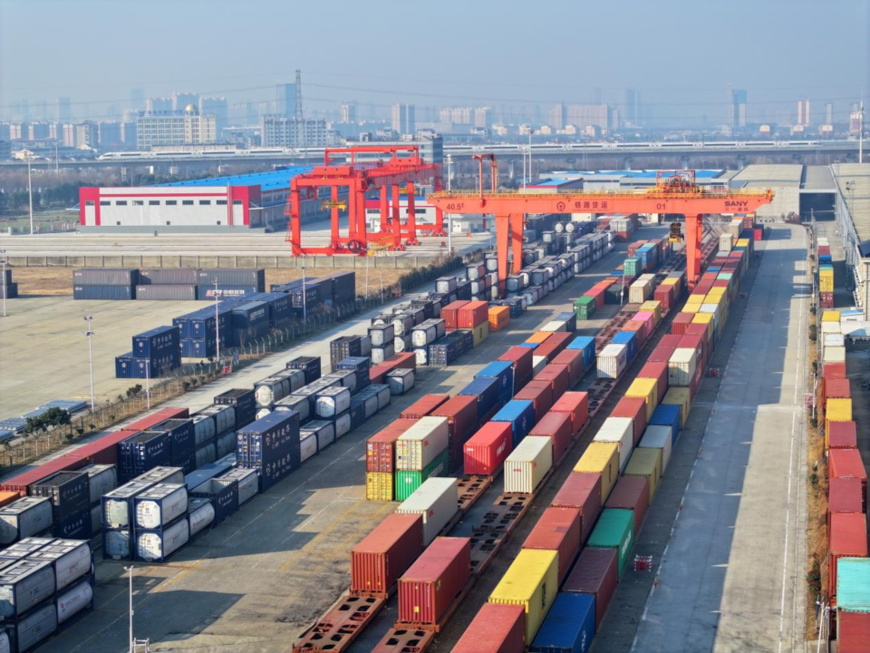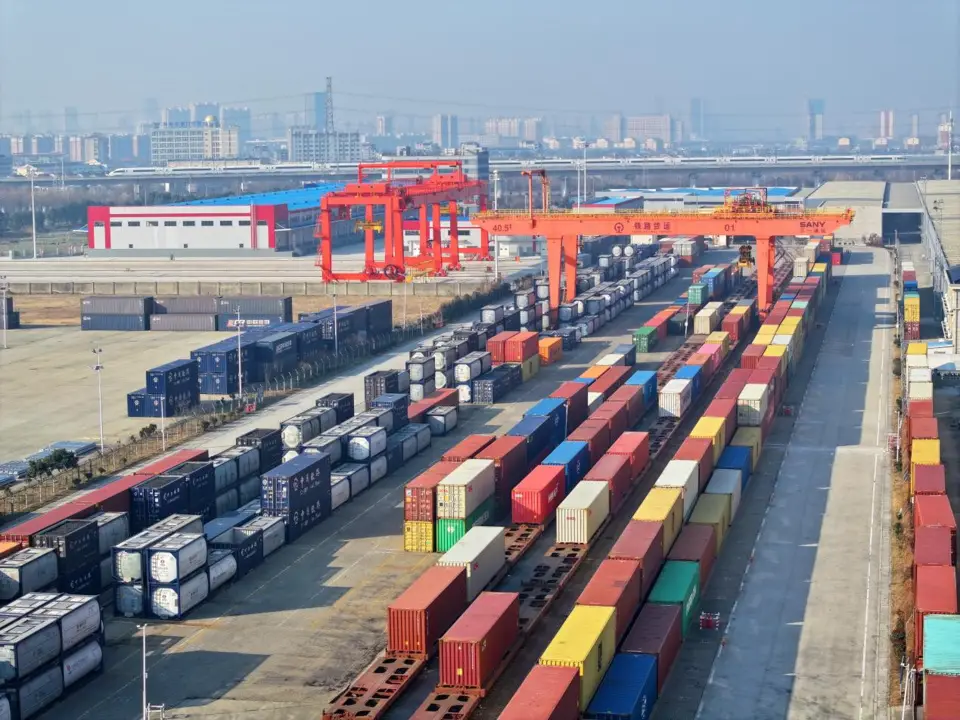By Li Hongxing, People's Daily

A gantry crane hoists containers at a logistics base in Hai'an, east China's Jiangsu province. (Photo by Xu Congjun/People's Daily Online)
If there were no fast logistics or delivery couriers, consumption in mountainous areas would be quite different.
Li Xingying's home is located deep in the Gaoligong Mountains in southwest China's Yunnan province.
Many years ago, she went to high school in another place in Nujiang Lisu autonomous prefecture. When her parents wanted to send her some local specialties from home, they had to ride a motorcycle for 20 kilometers on a mountain road to the post office, which took at least an hour. It would take at least two days, even if they were in the same prefecture, before Li could receive the specialties.
Now, every village in Yunnan has access to postal services, and villagers can enjoy courier services at their doorsteps. Recently, Li bought New Year's goods for her family, and it took less than four days for these packages to reach her hometown after traveling over 2,000 kilometers from east China's Zhejiang province.
"It's so convenient now. We can just order whatever we want on our phones and pick up the items with just a few steps outside," said Li's mother.
According to data released by the State Post Bureau, express courier firms nationwide handled 132.07 billion parcels in 2023, up 19.4 percent compared to the previous year. This figure has ranked first in the world for 10 consecutive years.
These parcels, connecting thousands of households and various industries, vividly depicted the vibrancy of China.
Smooth Logistics is driving development and improving living standards while meeting the needs of the people for a better life. Today, it takes as short as 48 hours for imported Boston lobsters to be put on the Chinese table from the moment when they are caught, and "Next-day" delivery is so quick that customers don't even have time to change their delivery address.
With the introduction of cold-chain logistics, various fruits, vegetables, and seafood can be kept fresh throughout the entire transportation process.
The logistics industry, connecting production and consumption, vitalizes the commodity market and fosters innovation. Embracing the dual opportunities of consumption and industrial upgrades, a secure and efficient logistics network that connects domestic and international markets is rapidly taking shape.
Efficiency in circulation and production are equally crucial for improving the overall operational efficiency of the national economy.
Over a decade ago, "logistics overload" was a buzzword on the internet, as cross-border parcels were difficult to deliver on time. Slow speed and high costs became bottlenecks for the development of the industry.
Problems give rise to changes. The introduction of electronic waybills initiated automated sorting, thus establishing intelligent logistics systems. The continuous improvement of urban and rural transportation infrastructure, with roads reaching every village, has made logistics smoother. China's internet penetration continues to increase, leading to a more complete and diverse logistics ecosystem.
Thanks to economic development and social progress, the logistics industry has benefited from the dividends of informatization and digitization. It has made a qualitative leap in terms of hardware facilities, software technology, and operational methods, demonstrating remarkable "Chinese speed" and impressive "Chinese efficiency."
The modern circulation system is a strong support for building a new development pattern. Every change in transportation tools and increase in business volume in the logistics industry, from manual handling to intelligent sorting, and from bulk freight to the opening of dedicated lines and air transportation, has greatly promoted the reshaping of the economic landscape.
Today, China's logistics industry has achieved a remarkable leap from handling 10 billion parcels each year to 10 billion parcels each month. The super-large market of China provides vast space and opportunities for the development of the logistics industry. The thriving and active logistics industry also plays a crucial role in enhancing the reliability of domestic circulation, while elevating the quality and level of international circulation.
More accesses result in greater space for development, and a higher level of openness yields stronger power for development. Thanks to the thriving international business of Chinese express courier firms, a Spanish consumer received a car diagnostic tool from China in just less than five days, and marveled at the speed of China's cross-border parcels.
According to customs statistics, the total imports and exports of China's cross-border e-commerce reached 2.38 trillion yuan (about $331 billion) in 2023, up 15.6 percent year-on-year.
As China's logistics industry accelerates its international expansion, the efficiency of global cargo transportation is steadily improving. With smooth logistics and global services, China's economy, with strong resilience and wide space, continues to bring new development opportunities to the world.
Logistics aggregates commercial flows, while commercial flows drive logistics. As cargo planes take off and land, cargo ships arrive at ports for loading and unloading, packages are sorted and transported, and delivery vehicles depart and return, a more complete and smooth modern distribution system is contributing to a more dynamic and resilient Chinese economy.
Li Xingying's home is located deep in the Gaoligong Mountains in southwest China's Yunnan province.
Many years ago, she went to high school in another place in Nujiang Lisu autonomous prefecture. When her parents wanted to send her some local specialties from home, they had to ride a motorcycle for 20 kilometers on a mountain road to the post office, which took at least an hour. It would take at least two days, even if they were in the same prefecture, before Li could receive the specialties.
Now, every village in Yunnan has access to postal services, and villagers can enjoy courier services at their doorsteps. Recently, Li bought New Year's goods for her family, and it took less than four days for these packages to reach her hometown after traveling over 2,000 kilometers from east China's Zhejiang province.
"It's so convenient now. We can just order whatever we want on our phones and pick up the items with just a few steps outside," said Li's mother.
According to data released by the State Post Bureau, express courier firms nationwide handled 132.07 billion parcels in 2023, up 19.4 percent compared to the previous year. This figure has ranked first in the world for 10 consecutive years.
These parcels, connecting thousands of households and various industries, vividly depicted the vibrancy of China.
Smooth Logistics is driving development and improving living standards while meeting the needs of the people for a better life. Today, it takes as short as 48 hours for imported Boston lobsters to be put on the Chinese table from the moment when they are caught, and "Next-day" delivery is so quick that customers don't even have time to change their delivery address.
With the introduction of cold-chain logistics, various fruits, vegetables, and seafood can be kept fresh throughout the entire transportation process.
The logistics industry, connecting production and consumption, vitalizes the commodity market and fosters innovation. Embracing the dual opportunities of consumption and industrial upgrades, a secure and efficient logistics network that connects domestic and international markets is rapidly taking shape.
Efficiency in circulation and production are equally crucial for improving the overall operational efficiency of the national economy.
Over a decade ago, "logistics overload" was a buzzword on the internet, as cross-border parcels were difficult to deliver on time. Slow speed and high costs became bottlenecks for the development of the industry.
Problems give rise to changes. The introduction of electronic waybills initiated automated sorting, thus establishing intelligent logistics systems. The continuous improvement of urban and rural transportation infrastructure, with roads reaching every village, has made logistics smoother. China's internet penetration continues to increase, leading to a more complete and diverse logistics ecosystem.
Thanks to economic development and social progress, the logistics industry has benefited from the dividends of informatization and digitization. It has made a qualitative leap in terms of hardware facilities, software technology, and operational methods, demonstrating remarkable "Chinese speed" and impressive "Chinese efficiency."
The modern circulation system is a strong support for building a new development pattern. Every change in transportation tools and increase in business volume in the logistics industry, from manual handling to intelligent sorting, and from bulk freight to the opening of dedicated lines and air transportation, has greatly promoted the reshaping of the economic landscape.
Today, China's logistics industry has achieved a remarkable leap from handling 10 billion parcels each year to 10 billion parcels each month. The super-large market of China provides vast space and opportunities for the development of the logistics industry. The thriving and active logistics industry also plays a crucial role in enhancing the reliability of domestic circulation, while elevating the quality and level of international circulation.
More accesses result in greater space for development, and a higher level of openness yields stronger power for development. Thanks to the thriving international business of Chinese express courier firms, a Spanish consumer received a car diagnostic tool from China in just less than five days, and marveled at the speed of China's cross-border parcels.
According to customs statistics, the total imports and exports of China's cross-border e-commerce reached 2.38 trillion yuan (about $331 billion) in 2023, up 15.6 percent year-on-year.
As China's logistics industry accelerates its international expansion, the efficiency of global cargo transportation is steadily improving. With smooth logistics and global services, China's economy, with strong resilience and wide space, continues to bring new development opportunities to the world.
Logistics aggregates commercial flows, while commercial flows drive logistics. As cargo planes take off and land, cargo ships arrive at ports for loading and unloading, packages are sorted and transported, and delivery vehicles depart and return, a more complete and smooth modern distribution system is contributing to a more dynamic and resilient Chinese economy.
 Menu
Menu
 Thriving logistics reflect China's economic vitality
Thriving logistics reflect China's economic vitality
















